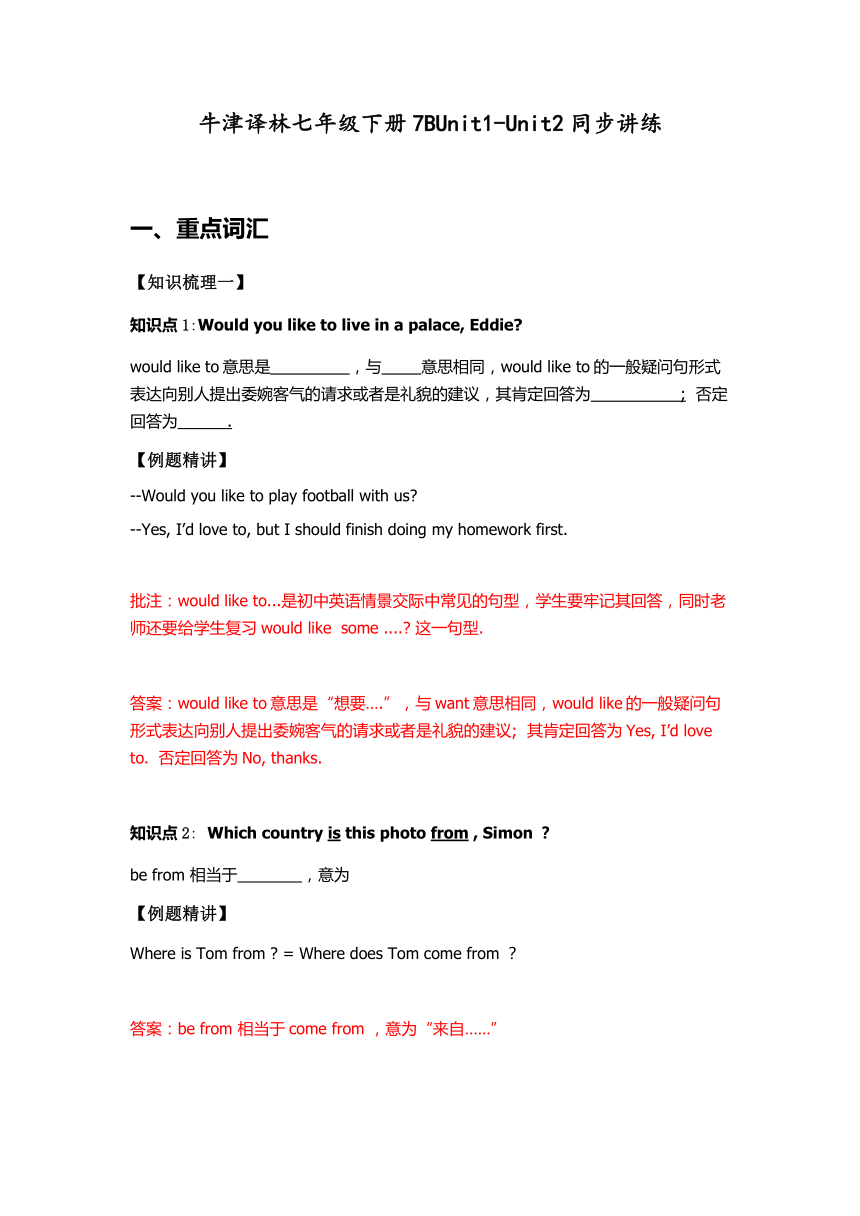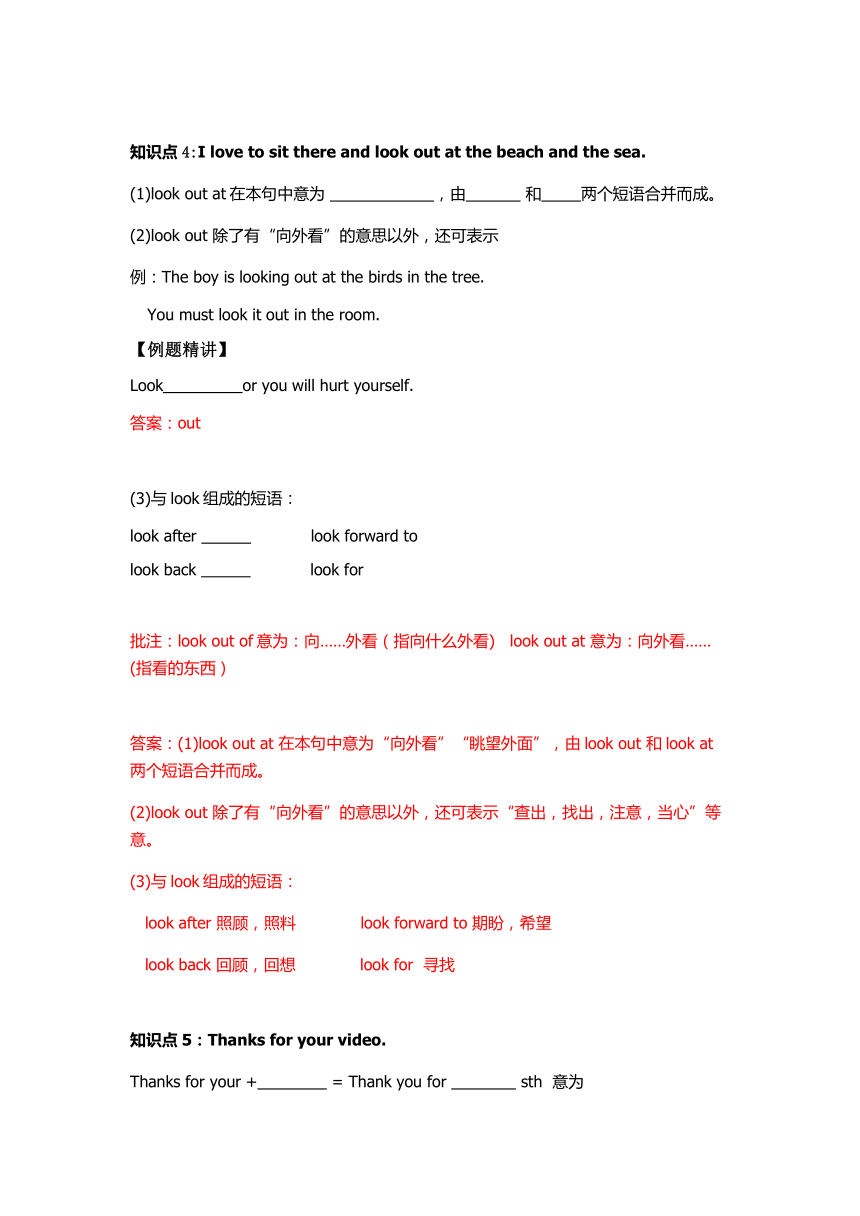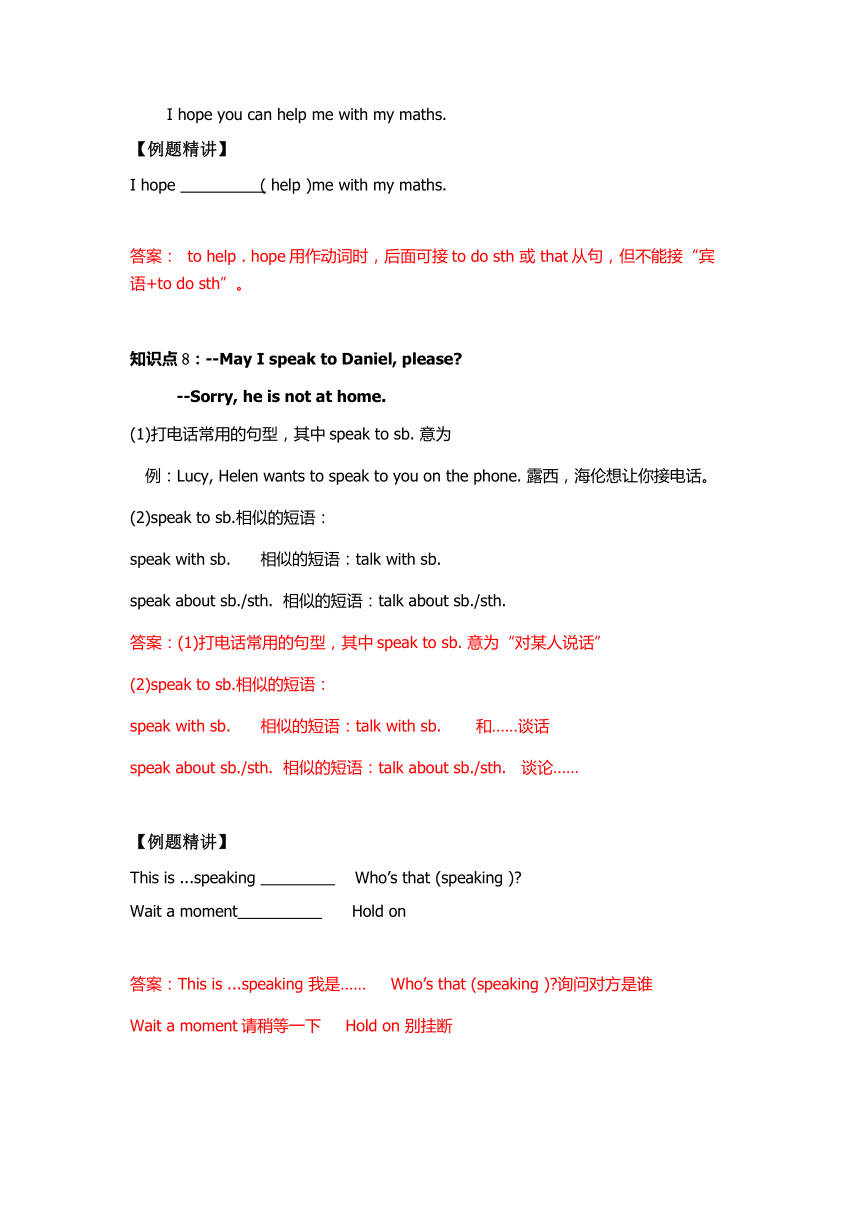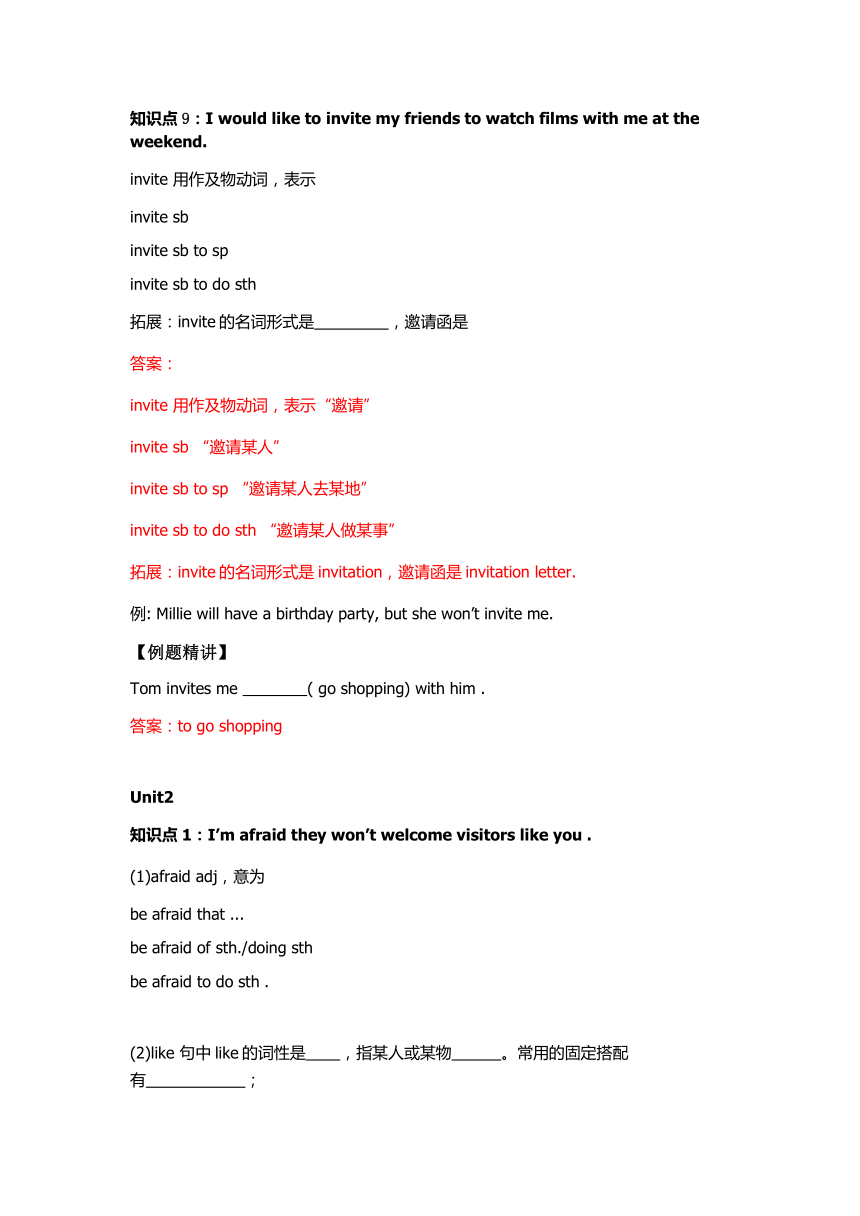牛津译林七年级下册7BUnit1-Unit2 知识点同步讲练
文档属性
| 名称 | 牛津译林七年级下册7BUnit1-Unit2 知识点同步讲练 |  | |
| 格式 | zip | ||
| 文件大小 | 46.0KB | ||
| 资源类型 | 教案 | ||
| 版本资源 | 牛津译林版 | ||
| 科目 | 英语 | ||
| 更新时间 | 2020-02-01 19:33:02 | ||
图片预览





文档简介
牛津译林七年级下册7BUnit1-Unit2同步讲练
一、重点词汇
【知识梳理一】
知识点1:Would you like to live in a palace, Eddie?
would like to意思是 ,与 意思相同,would like to的一般疑问句形式表达向别人提出委婉客气的请求或者是礼貌的建议,其肯定回答为 ; 否定回答为 .
【例题精讲】
--Would you like to play football with us?
--Yes, I’d love to, but I should finish doing my homework first.
批注:would like to...是初中英语情景交际中常见的句型,学生要牢记其回答,同时老师还要给学生复习would like some ....? 这一句型.
答案:would like to意思是“想要….”,与want意思相同,would like的一般疑问句形式表达向别人提出委婉客气的请求或者是礼貌的建议; 其肯定回答为Yes, I’d love to. 否定回答为No, thanks.
知识点2: Which country is this photo from , Simon ?
be from 相当于 ,意为
【例题精讲】
Where is Tom from ? = Where does Tom come from ?
答案:be from 相当于come from ,意为“来自……”
知识点4:I love to sit there and look out at the beach and the sea.
(1)look out at在本句中意为 ,由 和 两个短语合并而成。
(2)look out 除了有“向外看”的意思以外,还可表示
例:The boy is looking out at the birds in the tree.
You must look it out in the room.
【例题精讲】
Look or you will hurt yourself.
答案:out
(3)与look组成的短语:
look after look forward to
look back look for
批注:look out of意为:向……外看(指向什么外看) look out at 意为:向外看……(指看的东西)
答案:(1)look out at 在本句中意为“向外看”“眺望外面”,由look out 和look at两个短语合并而成。
(2)look out 除了有“向外看”的意思以外,还可表示“查出,找出,注意,当心”等意。
(3)与look组成的短语:
look after 照顾,照料 look forward to 期盼,希望
look back 回顾,回想 look for 寻找
知识点5:Thanks for your video.
Thanks for your + = Thank you for sth 意为
【例题精讲】
Thanks for your help = Thank you for me.
答案:helping , Thanks for your + n = Thank you for doing sth 意为:感谢某人……
知识点6:Your house is really different from the flats here in our town.
(1)(be) different from表示 ,其反意短语为 ,若要表示“在某一方面与……不同”,常用
例: Your answer is different from his.
The two sweaters are different in color.
答案:(1)(be) different from表示“与……不一样”,其反意短语为be the same as(与……一样),若要表示“在某一方面与…….不同”,常用(be) different in
(2)really是 ,修饰形容词 ,really的形容词是
【例题精讲】
用real的适当形式填空
1.I am hungry .
2.She is a friend .
答案:1.really 2. real. really是副词,修饰形容词different ,really的形容词是real (真正的)
知识点7:I hope to visit your home some day.
(1) some day意为
例:Some day you will know who I am.
(2) hope用作 时,后面可接 或 that从句,但不能接 。
例:We hope to see you again. =We hope we can see you again.
I hope you can help me with my maths.
【例题精讲】
I hope ( help )me with my maths.
答案: to help . hope用作动词时,后面可接to do sth 或 that从句,但不能接“宾语+to do sth”。
知识点8:--May I speak to Daniel, please?
--Sorry, he is not at home.
(1)打电话常用的句型,其中speak to sb. 意为
例:Lucy, Helen wants to speak to you on the phone. 露西,海伦想让你接电话。
(2)speak to sb.相似的短语:
speak with sb. 相似的短语:talk with sb.
speak about sb./sth. 相似的短语:talk about sb./sth.
答案:(1)打电话常用的句型,其中speak to sb. 意为“对某人说话”
(2)speak to sb.相似的短语:
speak with sb. 相似的短语:talk with sb. 和……谈话
speak about sb./sth. 相似的短语:talk about sb./sth. 谈论……
【例题精讲】
This is ...speaking Who’s that (speaking )?
Wait a moment Hold on
答案:This is ...speaking 我是…… Who’s that (speaking )?询问对方是谁
Wait a moment请稍等一下 Hold on 别挂断
知识点9:I would like to invite my friends to watch films with me at the weekend.
invite 用作及物动词,表示
invite sb
invite sb to sp
invite sb to do sth
拓展:invite的名词形式是 ,邀请函是
答案:
invite 用作及物动词,表示“邀请”
invite sb “邀请某人”
invite sb to sp “邀请某人去某地”
invite sb to do sth “邀请某人做某事”
拓展:invite的名词形式是invitation,邀请函是invitation letter.
例: Millie will have a birthday party, but she won’t invite me.
【例题精讲】
Tom invites me ( go shopping) with him .
答案:to go shopping
Unit2
知识点1:I’m afraid they won’t welcome visitors like you .
(1)afraid adj,意为
be afraid that ...
be afraid of sth./doing sth
be afraid to do sth .
(2)like 句中like的词性是 ,指某人或某物 。常用的固定搭配有 ;
like 也可以用作 ,表示
like sb/sth
like doing
like to do sth
答案:(1)afraid adj,意为:害怕的
be afraid that ...“担心,恐怕”,是一种委婉的语气。
be afraid of sth./doing sth 表示“害怕(做)某事”
be afraid to do sth .害怕/不敢做某事
(2)like句中like的词性是介词,指某人或某物“像,相似,类似”。常用的固定搭配有be like …像……样子;look like …看起来像;like 也可以用作动词,表示“喜欢”之意。
like sb/sth 喜欢某人/某物
like doing 喜欢做某事(习惯)
like to do sth 喜欢做某事(具体的事)
【例题精讲】
I’m afraid of (talk) to strangers.
答案:talking . be afraid of doing sth 害怕做某事
知识点2:most用法
(1)most of them 他们中的大多数,为固定搭配
例:大多数学生 most of the students
我的大部分时间 most of my time
(2)most与most of的区分
①most+ ,泛指多数,无范围。
②most of+ + ,仅指某一范围以内的多数。
③most of+人称代词,of不能少。
例:most young people.
most of the young people
most of them
答案:(1)most of them 他们中的大多数,为固定搭配“most of + 复数代词”
(2)most与most of的区分
①most+名词(不包括人称代词),泛指多数,无范围。
②most of+the/this/these/that/those/物主代词+名词,仅指某一范围以内的多数。
【例题精讲】
of them have 14 floors.
答案:Most . most of 大多数
知识点3:They help us with all kinds of problems.
help sb with sth = help sb (to) do sth
【例题精讲】
同义句转化
I often help my mother with housework. =
答案:I often help my mother to do housework. help sb with sth = help sb (to) do sth 帮助某人解决某种困难
知识点4:There is something wrong with my computer.
(1)不具体指明代替任何特定的名词或形容词的代词称为 。其分为代替人或代替物两类,代替人的不定代词有: ;代替物的复合不定代词:
(2)由some构成的复合词通常用在 中,由any构成的复合词通常用在
(3)形容词修饰不定代词时放在
例:something wrong
答案:(1)不具体指明代替任何特定的名词或形容词的代词称为不定代词。不定代词分为代替人或代替物两类,代替人的不定代词有:somebody, anybody, nobody, everybody;代替物的复合不定代词:something, anything, nothing, everything.
(2)由some构成的复合词通常用在肯定句中,由any构成的复合词通常用在疑问句和否定句中。
(3)形容词修饰不定代词时放在不定代词的后面
【例题精讲】
Is there wrong?(something /anything)
答案:anything
知识点5:Some college students are ready to help.
be ready to do sth. = be glad/willing to do sth .
be ready to do sth. 还可以表示
be /get ready for sth.
我乐于帮助你学习英语。
答案:be ready to do sth. = be glad/willing to do sth . 乐于做某事
be ready to do sth. 还可以表示:准备做某事
be /get ready for sth. 为……做好准备
【例题精讲】
I’m ready (help) you learn English .
答案:to help .be ready to do sth. 乐于做某事
知识点6:Some of them often visit the old people and do some shopping for them.
do some shopping 动词短语,意为 ,为固定结构,类似短语:
do some cleaning
do some reading
do some washing
答案:do some shopping 动词短语,意为“买东西”,为固定结构,类似短语:
do some cleaning 打扫卫生
do some reading 阅读书
do some washing 洗衣服
知识点7:You’re lucky to live in a community center like that, Simon.
(1)lucky adj 意为 ,be lucky to do sth
(2)lucky 名词为 , 副词为
答案:(1)lucky形容词,意为“幸运的”,be lucky to do sth 意为:有幸做某事
(2)
【例题精讲】
例1.I’m lucky (visit) you .
例2. , he didn’t hurt his legs.(lucky)
答案:1.to visit . be lucky to do sth 意为:有幸做某事 2.luckily. lucky 名词为luck, 副词为luckily.
知识点8:He will make a fire.
(1)fire用作 ,意为
be on fire
set something on fire
catch/take fire
(2)fire也可用作 ,意为 ,make/start/build a fire意为 .
答案(1)fire用作不可数名词,意为“火”,
be on fire着火了;
set something on fire“引火烧某物”;
catch/take fire“着火了”
(2)fire也可用作可数名词,意为“火灾,燃料”,make/start/build a fire意为“生火”
知识点9: I’m going to be a computer engineer.
be going to…表示 ;be going to be + (表示职业的名词),意为
答案: be going to…表示打算或计划做某事;be going to be(表示职业的名词),意为“打算当(从事某种职业)的人”。
【例题精讲】
例1.I’m going to to music after school. (listen)
例2.我长大的时候想做一名老师。
答案:1.listen . be going to do sth 计划做某事 2.I’m going to be a teacher when I grow up. be going to be(表示职业的名词),意为“打算当(从事某种职业)的人”。
知识点10:That sounds like a good idea .
(1)sound vi. 听起来 ;通常被用作 ,后接 作表语。类似的词:
答案:(1)sound vi. 听起来 ;通常被用作系动词,后接形容词或介词短语作表语。类似的词:smell/look/feel/taste
(2) sound like 听起来像……
知识点11:I want to help sick people .
sick adj意为 。
ill也有 之意,与 可以通用。
答案:sick adj,意为“生病的,恶心了”。
ill也有“生病的”之意,与sick可以通用。
【例题精讲】
用sick /ill 填写下列句子
1.The person needs our help.
2.The pet dog is badly .
答案:1. sick 2. ill . sick做定语修饰person.
知识点12:Is your washing machine not working ?
(1)work 意为
例:I want to find a good job .
(2)work 意为
例:My watch doesn’t work .
答案:
(1)work 名词 意为“工作”
(2)work 动词 意为“工作”
